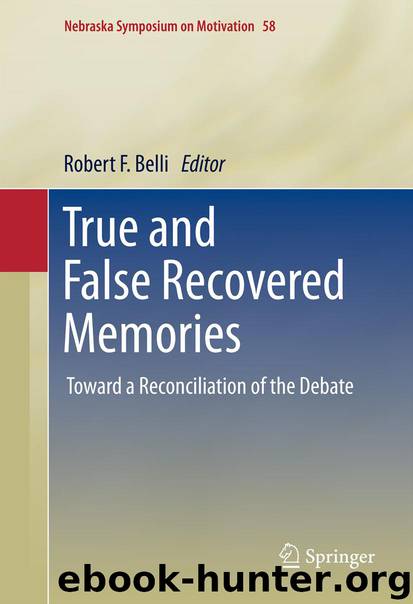True and False Recovered Memories by Belli Robert F. (Ed.)

Author:Belli, Robert F. (Ed.)
Language: eng
Format: epub
Publisher: Springer New York
Published: 2011-11-17T16:00:00+00:00
* * *
Laboratory Research Relevant to Recovered Memories
The child psychiatrist Lenore Terr (1991) suggested that sexually abused children sometimes cope by acquiring a dissociative, avoidant encoding style enabling them to disengage attention during abusive episodes and direct it elsewhere. Unable to escape physically from their abuser, they escape psychologically. The ability to attend to benign features of the environment, such as wallpaper patterns, and to pretend that one is somewhere else, may attenuate an otherwise emotionally overwhelming experience. Terr implies that dissociative encoding during abuse episodes may partly explain apparent amnesia for the abuse later in life. Although this encoding style may be adaptive if it helps the child cope emotionally with a very difficult, physically inescapable situation, it may have psychiatric consequences later in life.
To investigate these issues in the laboratory, we administered an item-cuing directed-forgetting task to three groups of women: CSA victims with PTSD, CSA victims without PTSD, and nonabused control subjects (McNally, Metzger, Lasko, Clancy, & Pitman, 1998). Subjects saw a series of words on a computer screen. There were three categories of words, varying in emotional valence. The trauma category included words such as incest and molested, the positive category included words such as carefree and confident, and the neutral category included household words, such banister and mailbox. Each word appeared for 2 s, replaced by a cue either to remember (RRRR) or to forget (FFFF) the previous word. Half of the words in each category were followed by remember cues and the others were followed by forget cues. We told subjects that we would test their memory for the RRRR word. However, after the encoding phase, we asked subjects to write down all the words they remembered having seen, regardless of whether a remember cue or a forget cue had followed the word.
A standard directed forgetting effect would entail better recall for RRRR words than for FFFF words. This effect results from subjects endeavoring to memorize a word, but then ceasing to do so when an FFFF cue follows it. Hence, superior recollection of RRRR words relative to FFFF words is attributable to better encoding of the former than the latter (Golding, 2005; Johnson, 1994). To the extent that subjects can disengage their attention from FFFF words, their memory for these items should be impaired.
Inspired by Terr’s (1991) ideas about dissociating attention from threat cues, we predicted that CSA subjects, especially those suffering from PTSD, would exhibit superior ability to abort encoding of trauma words relative to other words and relative to nonabused control subjects. That is, their motivation to avoid thinking about abuse-related material and their acquired skill in dissociating their attention from such material would result in relatively poor memory for trauma words. (Incidentally, our interpretation of Terr implies that psychiatrically suffering CSA subjects should not only exhibit very poor recall of trauma words followed by forget instructions; they should also not exhibit enhanced remembering of trauma words followed by remember instructions. That is, their propensity to avoid processing cues related to
Download
This site does not store any files on its server. We only index and link to content provided by other sites. Please contact the content providers to delete copyright contents if any and email us, we'll remove relevant links or contents immediately.
Spell It Out by David Crystal(36096)
Life for Me Ain't Been No Crystal Stair by Susan Sheehan(35783)
Cecilia; Or, Memoirs of an Heiress — Volume 1 by Fanny Burney(32523)
Cecilia; Or, Memoirs of an Heiress — Volume 2 by Fanny Burney(31928)
Cecilia; Or, Memoirs of an Heiress — Volume 3 by Fanny Burney(31912)
The Great Music City by Andrea Baker(31893)
Professional Troublemaker by Luvvie Ajayi Jones(29639)
We're Going to Need More Wine by Gabrielle Union(19019)
The Secret History by Donna Tartt(18993)
Twilight of the Idols With the Antichrist and Ecce Homo by Friedrich Nietzsche(18598)
All the Missing Girls by Megan Miranda(15878)
Cat's cradle by Kurt Vonnegut(15293)
Pimp by Iceberg Slim(14461)
Bombshells: Glamour Girls of a Lifetime by Sullivan Steve(14036)
For the Love of Europe by Rick Steves(13791)
Talking to Strangers by Malcolm Gladwell(13327)
Norse Mythology by Gaiman Neil(13312)
Fifty Shades Freed by E L James(13214)
The Social Justice Warrior Handbook by Lisa De Pasquale(12175)
